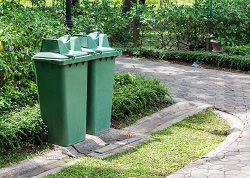How Schools Can Lead the Way in Recycling Efforts
Posted on 05/09/2025
How Schools Can Lead the Way in Recycling Efforts
Schools represent more than just learning centers--they shape the habits, values, and future actions of students and the wider community. When it comes to environmental responsibility, especially recycling, schools are uniquely positioned to be catalysts for positive change. In this comprehensive guide, we explore how schools can lead recycling efforts, outlining actionable strategies, discuss the significance of sustainable practices, and present ways educators and students can champion greener habits for lasting impact.
Why Recycling Initiatives in Schools Matter
Waste production is a pervasive issue, but educational institutions, with their constant flow of materials, resources, and young minds, can significantly influence how waste is managed and minimized. Here are the key reasons school recycling programs are essential:
- Early Intervention: Children develop life-long habits in school. Teaching them about recycling from a young age instills a sense of responsibility and environmental stewardship.
- Volume of Waste: Schools create large amounts of paper, plastic, food, and electronic waste. Addressing these streams can significantly reduce landfill contributions.
- Community Leadership: When schools lead recycling efforts, it demonstrates civic responsibility, influencing families and local communities to adopt similar practices.

Building a School-Wide Recycling Culture
Effective recycling in schools isn't the result of a single bin or a posted sign. It requires a comprehensive commitment at all levels--from kindergarten classes to administrative offices. Here's how schools can set the standard:
1. Develop a Recycling Action Plan
- Audit current waste streams to identify the types and quantities of waste generated.
- Set measurable objectives, such as reducing landfill waste by a certain percentage annually.
- Designate a school sustainability team including students, teachers, custodians, and parents.
- Decide which materials will be recycled (paper, plastic, aluminum, e-waste, etc.).
2. Raise Awareness Through Education
Education is the cornerstone for any behavioral change. Integrate recycling education into the school curriculum by:
- Hosting classroom discussions on the environmental impacts of waste.
- Organizing interactive workshops with local recycling experts.
- Using educational posters and displays in common areas to remind students to recycle properly.
3. Make Recycling Accessible and Easy
Recycling efforts fail when students and staff don't know how or where to recycle. To streamline the process:
- Place clearly labeled bins for different recyclables in every classroom, hallway, and cafeteria.
- Use color-coded bins and signs with images, making it easy for all age groups to participate.
- Regularly empty and maintain recycling bins to prevent overflow and contamination.
4. Involve All Stakeholders
School recycling programs thrive on collective participation.
- Engage parents by sharing information in newsletters about the school's recycling initiatives and how to support them at home.
- Enlist school staff to act as recycling ambassadors, ensuring proper use of recycling stations.
- Create student "Green Teams" to monitor recycling areas and motivate peers.
5. Track Progress and Celebrate Achievements
Tracking recycling data helps sustain enthusiasm and shows the real-world impact of school sustainability efforts.
- Measure and record the amount of material diverted from landfill monthly or quarterly.
- Publicly recognize classrooms or grades that excel in minimizing waste or recycling correctly.
- Host "Recycling Challenges" with rewards to incentivize participation and improvement.
Expanding School Recycling Beyond Basics
1. Composting Food Waste
School cafeterias and lunchrooms often produce significant food waste. By introducing composting, schools can:
- Reduce organic waste sent to landfills, thus minimizing methane emissions.
- Create compost for school gardens, teaching students about ecosystems and the food cycle.
- Run educational campaigns on food waste reduction and composting best practices.
2. Electronic Waste Recycling
The advancement of technology in education means more electronics--and more E-waste. Schools can:
- Organize periodic E-waste collection drives for items like broken tablets, printers, and batteries.
- Partner with certified E-waste recyclers to ensure responsible disposal.
- Educate students on the environmental dangers of improper electronics disposal.
3. Reuse Before Recycle
Recycling is just one aspect of sustainability. A truly effective program emphasizes the reduction and reuse of materials:
- Encourage the use of reusable water bottles, lunchboxes, and cutlery within the school.
- Host "swap days" for school clothes, books, and supplies.
- Promote digital assignments to minimize paper waste.
Empowering Student Leadership in Recycling
One way schools can lead recycling efforts is by nurturing student leaders in sustainability. Empowered students become advocates not only within their school but also in their communities. Here's how schools can harness this potential:
Formation of Eco-Clubs
- Support students in forming environmental or recycling clubs.
- Allow these groups to plan, promote, and manage recycling initiatives, giving them ownership and real-world experience.
- Offer leadership roles within clubs to foster communication, teamwork, and organization skills.
Peer-to-Peer Education
- Encourage students to present at assemblies or develop educational materials for younger peers.
- Assign "recycling mentors" to guide and encourage their classmates.
- Support participation in district, state, or national recycling competitions and environmental projects.
Community Outreach and Partnerships
- Coordinate with local businesses, nonprofits, and government agencies for joint recycling events.
- Invite guest speakers and field trips to recycling centers to provide students with tangible context for their efforts.
- Spearhead community clean-up projects, reinforcing the connection between recycling and broader environmental goals.
Integrating Recycling into the Curriculum
Sustainability education is most effective when it's interwoven into subjects students already study. Consider the following approaches:
- Science: Explore decomposition, resource cycles, and environmental science through hands-on experiments with recycling and composting.
- Math: Analyze recycling data, create graphs, and project the positive impact of school recycling initiatives.
- Art: Use recyclable materials for creative projects, reinforcing the concept of reuse.
- Social Studies: Examine the cultural and global implications of waste and sustainable living.
Overcoming Challenges in School Recycling Programs
Starting and sustaining a robust school recycling system isn't without obstacles. Common challenges include:
- Contamination: Non-recyclables placed in recycling bins can spoil the whole batch. Address this with better signage, education, and regular monitoring.
- Lack of Awareness: Not all students and staff may be familiar with recycling protocols. Ongoing training and visible reminders can help mitigate this.
- Limited Resources: Budget constraints or lack of nearby recycling services may pose obstacles. Creative partnerships and grant funding can bridge gaps.
- Engagement Fatigue: Initial excitement can wane. Rotating student leaders, new challenges, and community recognition can keep momentum alive.
Success Stories: Schools Leading the Way in Recycling
Many schools worldwide have become recycling champions, demonstrating the effectiveness of well-implemented programs:
- Lincoln Elementary in the United States reduced their landfill waste by 60% through comprehensive recycling and composting initiatives, student-led teams, and cross-curricular education.
- St. Mary's Academy in Canada celebrated "Waste-Free Wednesdays," resulting in increased engagement and doubled recycling rates compared to the previous year.
- Greenfield School District in Australia partnered with local recycling companies, set up E-waste drop-off centers, and integrated recycling into classroom projects across grade levels.
These examples prove that recycling in schools is not only possible but can be transformative when backed by community will and creativity.
The Ripple Effect: Beyond School Grounds
When students learn to recycle, they often bring those habits back home, influencing family and friends. In this way, school-led recycling efforts have the power to nurture a generational shift toward sustainability.
- Students frequently encourage their households to adopt better waste sorting and recycling practices.
- Community waste reduction improves as parents and neighbors support and replicate school initiatives.
- By nurturing environmental leaders, schools help seed a culture of stewardship for future generations.

The Future of School Recycling: Innovative Approaches
With technology and new teaching strategies, schools can embrace cutting-edge approaches to waste reduction:
- Smart Bins: Automated recycling bins that use sensors or AI to sort materials improve accuracy and reduce contamination.
- Zero Waste Schools: Some institutions strive for "zero waste," rethinking procurement, reducing single-use products, and maximizing recycling and composting.
- Environmental Apps: Mobile applications and digital platforms educate students and track individual participation, making recycling fun and measurable.
Conclusion: Schools as Community Recycling Leaders
How schools can lead recycling efforts is a story of leadership, education, and lasting influence. By fostering a culture where students, staff, and families work together, schools can drive significant environmental improvements--not only in their own operations but across the broader community.
Empowering the next generation with the knowledge, motivation, and practical tools to address environmental challenges is an investment in a sustainable future. As schools embrace robust recycling programs, they become not only centers of learning but beacons of positive change--inspiring a ripple effect that benefits the planet for generations to come.
Start Small, Think Big
Every school can make a difference. Whether you're a teacher, student, administrator, or parent, your actions matter. Begin with the basics, celebrate progress, and always strive for greater impact. Together, schools can pave the way toward a greener, cleaner world.
Latest Posts
Key Strategies for Effective Skip Hire Management
Unveiling the Plastics You Should Reconsider Using
Navigating the World of Hazardous Waste: What Qualifies as Dangerous

 020 3859 5580
020 3859 5580 020 3859 5580
020 3859 5580





 House Clearance
House Clearance Rubbish Collection
Rubbish Collection House clearance in London has never been easier, as Junk Removal Services can take care of your every need. From individual house junk...
House clearance in London has never been easier, as Junk Removal Services can take care of your every need. From individual house junk... With Junk Removal Services you can be confident that you’ll receive the most professional and affordable rubbish collection service within the London...
With Junk Removal Services you can be confident that you’ll receive the most professional and affordable rubbish collection service within the London...





